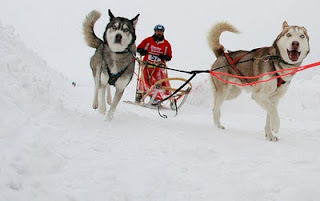-What was your dog bred to do? German Shepherds are beautiful dogs, are trainable, and are really intelligent. However, these dogs were bred to be all purpose herding and guarding dog. They can be a great family pet...but in the city, shepherds who are looking for a job to do and aren't mentally stimulated enough will often get themselves into trouble by barking at every noise they notice with their superior hearing.
-What floor do you live on? Generally speaking, when I'm asked about what kind of dog to get in the city, I tell people that size doesn't matter as much as temperament - with this one exception. Do you want to be helping a 200 pound mastiff up and down the stairs to your 3rd floor apartment if he is unable to get up and down the stairs (arthritis/hip dysplasia/accident)?
-What is the age of the dog? I speak from experience: potty training a puppy from the third floor sucks. Also, puppies need a lot of attention. At the beginning, they need to go out at least once or twice an hour, every hour. If you plan on having your puppy alone for 8 hours at a time while you're at work, a puppy is likely not going to be an appropriate match for you. Consider an adult dog.
-Are there apartment/condo size restrictions on the dogs that can live there? You found the perfect companion for you- a beautiful, happy, 75 pound lab mix from the shelter that you can take jogging. Too bad your lease specifies dogs under 50 pounds and it's not negotiable.
-Are there breed bans/lease restrictions for the dog you are interested in? Breed Bans are popping up all over the country. Usually they are restricted to a county or city, but many landlords are also writing breed bans into leases. Depending on the law in each locale, if your dog is muzzled at all times, or if you pass a CGC certification, your dog can stay. Some have an outright ban and you are not allowed to have that dog in the locale at all. Many home insurance companies will not cover you if you have specific breeds of dog. (For more information on the insurance end of things, here is a great article highlighting it).
-Investigate every possibility and do your research: Most people think that Greyhounds are fast dogs with an insatiable appetite for running. This is absolutely not the case for most Greys! They are called the 40 mile an hour couch potato for a reason! So you may have an idea in your head about a particular type of dog - and you could be missing out on the perfect dog for your lifestyle! This may not be the best type of dog for someone who wants a jogging buddy in the city, but is a lovely companion for most on-the-go city slickers. Conversely, Boston Terriers are sturdy, little dogs, and tend to be higher energy than you might expect. Some like to run (as long as it's not too hot or too cold outside), and can be great for a more active family in the city.
"Hey, we'll come live in the city! Just keep the AC set to 30 degrees all year round and we'll be fine!"
There is one more point I'm going to make: In our region, dogs are frequently trucked in from the south (where there are high kill shelters). These dogs can be wonderful companions and some can do really well living in the North. However, many of these dogs meet their well-intending new owners on the side of the street at a highway pit-stop, hop out of the truck, pee, hop in the new owners car, and head into their new life in an apartment. There are so many things wrong with this I don't even know where to begin.
Many of these dogs from high kill shelters are feral, born of feral parents, or are under-socialized. When you take a dog who has never seen people and the first person it ever sees ties a noose around it's neck, tosses it into a truck, and hauls it 2,000 miles to the north, there can be problems - like fear of new people, and for good reason! The ride in this truck, is in a crate - which can be a useful house-training tool when used correctly, but as a way to confine a scared dog who has never seen something like this can make future house-training and confining a challenge. Keeping this dog confined with other barking, frightened dogs can absolutely have an effect long term with a dogs relationship to vehicles, other dogs, and strangers. These dogs might do well in a quiet environment with a single person or a predictable family routine, but to be very clear -many of these dogs need a lot of work to acclimate to living with a family.
One of the saddest things I see, and I'm seeing it with greater frequency, are well intending people who got a dog that was flown / trucked in to save it, only to be burdened with a high maintenance dog that is terrified of every city noise, scared to death of new people, reacts poorly to other dogs, and put that dog in an overstimulating city environment without working with a fostering group first to see if the dog can handle specific life experiences common to cities. I really have a big problem with the agencies that promote this method of transferring dogs to new owners who are trying to do something good by adopting a homeless dog from a kill shelter.
Never, NEVER, take a dog home that you meet off of a truck at a highway pit stop. Similarly, NEVER take a dog home that you haven't met first. There are hundreds of dogs in your area that need homes. Some of these dogs were trucked in from other places, but at least you can meet the dogs first without the pressure of standing on I95 with a truck full of dogs that NEED YOU NOW. Putting dogs through the stress of traveling by plane, truck, or other means of "shipping" and going home with you is not an ideal way of starting things off right, especially when vetting if a dog can thrive in a highly stimulating city environment. There are great fostering groups, like Forever Home Rescue and Homeless Animal Rescue Team (H.A.R.T) that will pick dogs up from trucks in parking lots and highway rest stops. These are trained volunteers that take these dogs, evaluate them, get the the appropriate vet care they require, and then pair owners up with these dogs. For a potential dog owner that has never had experience with dogs like the ones coming off of this truck, it can be a lot to take in and work with. Leave it to the pros, and wait for a dog that you meet, face to face - and I don't mean in a parking lot just before you take it home.
Please work with the rescue agencies, shelters, or good breeders in your region. Meet the dog first to make sure it's a good match for you and your family before taking the dog home. If you feel pressured at ALL by the rescue group or breeder, don't do it, no matter how cute the dog is.
A well vetted dog that is satisfied mentally, gets enough exercise, plenty of attention from the owners, and gets regular training/vet visits can thrive in a city environment - but you have got to do your homework first, even more so than in rural areas.


Right on the mark!! I am fortunate to have a big backyard in the middle of the city so my little bundle of energy can run run run. Otherwise he, and I would be completely miserable. Energy level for a city dog is so important. Great blog! Thanks for posting.
ReplyDeleteThank you SO much for this posting. It provides a lot of food for thought to adoptive families. Let's extend the 'buy local' movement to our best friends.
ReplyDelete